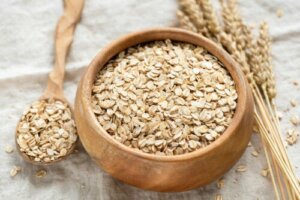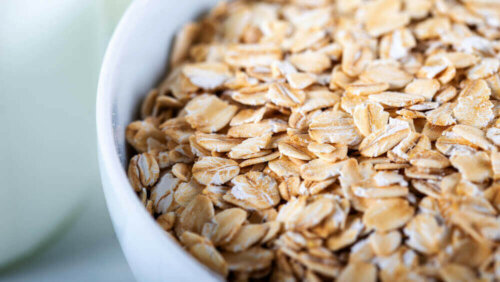Should You Eat Oatmeal to Sleep Better?


Written and verified by psychologist Valeria Sabater
If you don’t usually consume oatmeal as part of your diet, you may need to better understand its many health benefits. Among them is that it can promote better sleep.
Better rest is synonymous with health, well-being, and having more energy to be more productive during the day. Do you sleep your eight hours? Or are you perhaps one of those who wakes up every so often and wakes up with the clear feeling of not having rested?
If so, it’s time to improve certain lifestyle habits and put some tricks into practice. Among them, consuming a glass of warm oatmeal is recommended after dinner.
Below, we give you five good reasons to convince you to include oatmeal in your dinners to get better rest.
1. Helps regulate blood cholesterol and glucose

Enjoying a deep and restful sleep depends on many factors, and two of them are very specific: dinner time and the foods that you include in this last meal of the day.
If you eat very late or eat something heavy, you’ll interrupt the effectiveness of that task and you’ll wake up.
- You need to have an early dinner, between 7 pm and 9 pm.
- Among the foods that you can include in your dinners, oatmeal is a more than successful complement that allows you to get restful sleep.
- Oats, as well as oatmeal water, contain a lot of nutrients.
For example, this will allow you to maintain an adequate glucose balance to avoid dangerous peaks, something very ideal for those last hours of the day.
If you want to enjoy good rest, remember that you shouldn’t eat red meat at night. The reason? It contains stimulants such as hypoxanthine. Hence, it’s much better to opt for fish or cereals such as oats.
2. Oatmeal is high in melatonin and vitamin D
Oatmeal is a natural source of melatonin, a compound that regulates your sleep/wake cycle.
It’s not that it will make you fall asleep immediately all by itself, like a sleeping pill would. What it does is adjust your cycle so that you feel sleepy when night comes.
According to experts, oatmeal helps you regulate these cycles thanks to its melatonin and vitamin D content. It also helps you manage:
- The impact of migraines.
- Chronic fatigue.
- Irritable bowel syndrome.
- Bone loss (osteoporosis).
To enhance their benefits, look for oatmeal enriched with vitamin D in your supermarket. This way, you’ll be increasing serotonin production to help you sleep.
3. Source of B vitamins

Due to its contribution of melatonin and B vitamins, oatmeal is suitable to stimulate the secretion of serotonin and promote better and uninterrupted rest.
B complex vitamins play several roles in your body. The most important has to do with proper nervous system functioning.
- Oatmeal is very high in vitamin B6, or pyridoxine. This is very necessary for converting the energy in food into glucose and for metabolizing fat and proteins.
- Vitamin B3 helps increase the production of tryptophan, an essential amino acid that encourages relaxation and sleep.
If you have a deficiency in one of these vitamins, you’ll feel the effects, the most common being physical fatigue and insomnia.
Discover: The 10 Best Foods for Fighting Insomnia
4. Avenine helps you fight anxiety and sleep better
Oatmeal contains avenine and trigonelline. These are two types of prolamines (vegetable proteins). They help reduce anxiety, nervousness, and the mental and physical agitation that tends to build up over the day and keep you from falling into a deep, healthy sleep.
However, we should point out that this type of vegetable protein in oatmeal often acts as an allergen for people with celiac disease, so it’s best to avoid oats if that’s your case.
5. It helps mitigate stress

One of the major triggers of insomnia is chronic anxiety or stress. These emotional processes stimulate the adrenal gland and gradually release certain hormones that cause muscular tension, stress, and fatigue.
Regularly consuming oatmeal will help you normalize many hormones that correlate with stress. You’ll balance your cortisol levels and support your nervous system due to oatmeal’s significant vitamin B complex content.
Oatmeal encourages internal homeostasis. This, in turn, relaxes you, fosters good digestion, and supports good liver health.
For all these reasons, oatmeal is a food that can help you get deeper, more restorative sleep. However, remember that, if you want to take advantage of its benefits, you should drink that glass of oatmeal one to two hours every day before bed. Drink it warm!
All cited sources were thoroughly reviewed by our team to ensure their quality, reliability, currency, and validity. The bibliography of this article was considered reliable and of academic or scientific accuracy.
- Corio Andújar, R., & Arbonés Fincias, L. (2009). Nutrición y salud. Nutrition and Health, 35, 9, 423–479. https://doi.org/10.1016/S1138-3593(09)72843-6
- Ávila Zúñiga, P. (n.d.). El secreto: 5 tiempos de comida al día. Clínica En Especialidades Dietoterapéuticas. Retrieved from https://www.carmenlia.com/Articulos/5_comidas_al_dia/5_tiempos_de_comida_al_dÃa.pdf
- Rozano Ladrón, V., Quiróz Santiago, C., Acosta Pulido, J. C., & Pimentel Ayaquica, L. A. (2004). Hortalizas, las llaves de la energía. Revista Digital Universitaria, 5. Retrieved from http://www.revista.unam.mx/vol.6/num9/art88/sep_art88.pdf
- Celorio Fries, G. A., & Mota López, M. Á. (2016). Salud Mental y Nutrición: Una revisión sistemática. Cádiz: Colegio Oficial de Enfermería de Madrid.
- Romo, M. (2014). Entrena tu cerebro. Neurociencia para la vida cotidiana. Barcelona: Editorial Alienta.
This text is provided for informational purposes only and does not replace consultation with a professional. If in doubt, consult your specialist.








